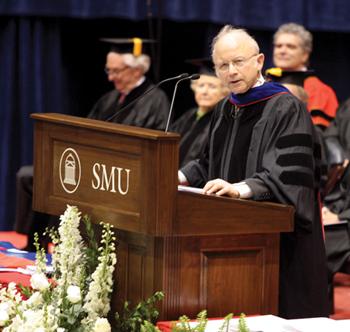
Allen Weinstein, Ninth Archivist of the U.S., gives the Commencement Address to graduates and families in Moody Coliseum on May 17, 2008 (Lindsey Perkins)
Dr. Allen Weinstein, archivist of the United States, addressed the controversy of presidential libraries during his commencement address on May 17, saying he believes SMU is the right place for the George W. Bush library.
“Many of you will remain as alumni and supporters of this great university for the rest of your lives,” Weinstein said. “So, it is worth asking at the outset: Will the planned presidential library center be of benefit to SMU? My short answer is yes, absolutely.”
Nearly 2,000 undergraduate, graduate and professional degrees were awarded to SMU students during the 93rd Commencement held on May 17. In addition, SMU awarded honorary degrees to Paula S. Apsell, Wallace S. Broecker, and Edith and Peter O’Donnell, Jr.
Weinstein says presidential libraries constitute “a defined component in the legacy of our modern presidents.”
“Put simply, the libraries themselves are normally constructed with funds provided by supporters of each president, after which they are funded by annual stipends provided by the U.S. Congress and managed by NARA,” Weinstein said. “Any research center or policy institute is closely linked to the library but privately funded.”
Weinstein acknowledged that these centers generate controversy, but that it often dies down as “the particular facility proves to be properly managed and sensitive to the need to provide a genuine diversity of views and voices.”
“Normally, the narrower and less open to broad-based dialogue a center becomes, the greater its problems,” he said. “The major cost to the university will be the challenges to that community and to the Bush Library community, as both evolve, to maintain the greatest measure of cooperation and civility at all times, while resisting the temptation to turn normal policy disagreements into burning, divisive public issues.
“No university is better prepared for civility and cooperation than SMU,” he said. “You have dealt with issues and kept your community together with dignity and grace.”
Weinstein says the library will SMU’s profile as an important research center. “And in time, like our national headquarters in Washington, D.C., and numerous other archival facilities from Massachusetts to Alaska, the Bush 43 library will play its own distinctive role by offering research opportunities and public programs, which promote the study of American history, civic participation, and civic literacy in general,” he said.








